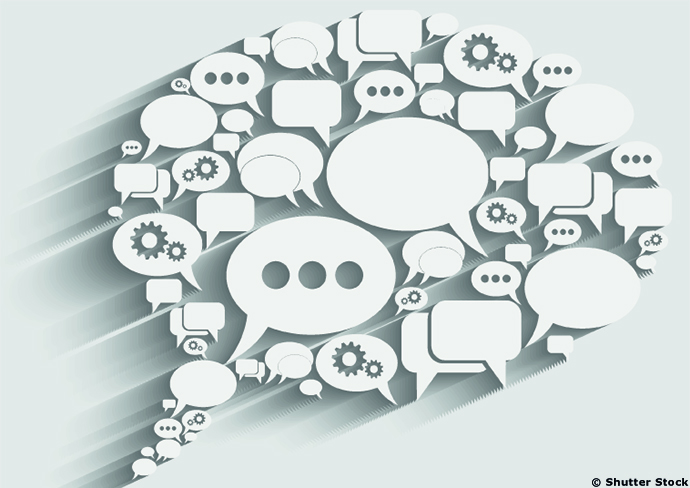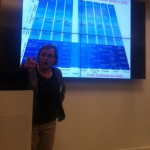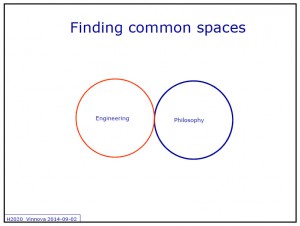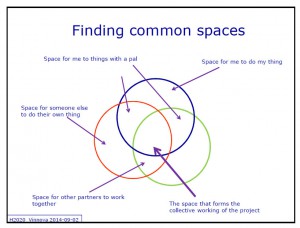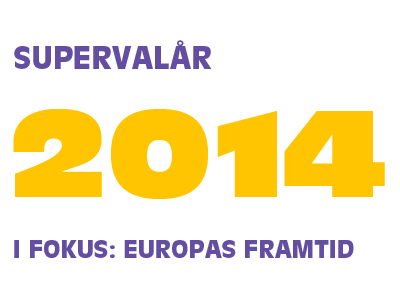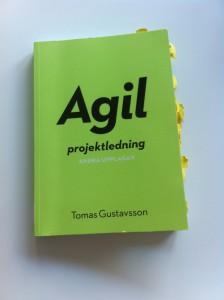Författararkiv: Ulrika Nilsson
– WHAT DOES EUROPE MEAN TO ME?
Working with societal development and creative projects and to be part of the greater work helping to create an open, just and socially inclusive European democratic society that is also part of the World, is to me the most exciting and fun job ever to have!
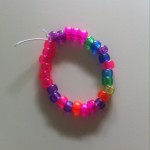 The image of a bracelet made by a child in pre-school comes to my mind, little tiny beads of different colors put together in a never-ending combination to form a bracelet. Now let each color represent a nation and the bracelet becomes an image of transnational collaboration and perhaps a European project. Europe is for me a continent where each country is like a colored bead coming together forming a free and vibrant transnational community of different colors. It is a public space where we as individuals can act and exist in a larger context. The larger the context – the greater the personal freedom. The larger the community – the greater the affinity. The greater the knowledge of the World, the greater the sensitivity and understanding for each other as fellow European citizens. It is in the interplay with others that we experience freedom and can realise ourselves as individuals. It is also in the meeting and the collaboration with the World around that Europe becomes Europe. It is in the meeting with each other that we can develop our identity as individuals and transform our thoughts into ideas and feelings. Europe is part of my identity as a human being, woman, mother and a Swedish citizen. Europe is a democratic society in the making that is also part of the global community. The European Union is representing one of the most innovative, interesting and exciting, democratic developments in our contemporary time.
The image of a bracelet made by a child in pre-school comes to my mind, little tiny beads of different colors put together in a never-ending combination to form a bracelet. Now let each color represent a nation and the bracelet becomes an image of transnational collaboration and perhaps a European project. Europe is for me a continent where each country is like a colored bead coming together forming a free and vibrant transnational community of different colors. It is a public space where we as individuals can act and exist in a larger context. The larger the context – the greater the personal freedom. The larger the community – the greater the affinity. The greater the knowledge of the World, the greater the sensitivity and understanding for each other as fellow European citizens. It is in the interplay with others that we experience freedom and can realise ourselves as individuals. It is also in the meeting and the collaboration with the World around that Europe becomes Europe. It is in the meeting with each other that we can develop our identity as individuals and transform our thoughts into ideas and feelings. Europe is part of my identity as a human being, woman, mother and a Swedish citizen. Europe is a democratic society in the making that is also part of the global community. The European Union is representing one of the most innovative, interesting and exciting, democratic developments in our contemporary time.
Together as European citizens we are exploring new ways to collaborate and co-exist in peace.
VOICE OF CULTURE FOR EUROPE
Do you work with culture and creativity? Do not miss the new opportunity to add your voice to the policy development in the field of culture and creativity in Europe.
The EU-level invites cultural professionals and stakeholders from civil society in the European member countries to participate in five brainstorming sessions 2015 – 2016 focusing on different key issues. The core ideas from the brainstorming sessions will be gathered in a policy paper that will be presented to the European Commission and also be important to the working groups within the Open Method of Coordination (OMC). The structured dialogue was an important meeting place in the development of Creative Europe 2014 – 2020. For each brainstorming session 40 representatives will be invited to take part from across Europe. The first two calls for participants have just been launched. The deadline for applications is 25 March 2015!
- Audience Development via Digital Means
Brainstorming Session 18-19 June, Amsterdam/The Netherlands
- Participatory Governance in Cultural Heritage
Brainstorming Session 2-3 July, Florence/Italy
Apply via the following web site to make your voice heard in the European policy-making process: http://www.voiceofculture.eu
Find out more about the launch of the structured dialogue: http://ec.europa.eu/programmes/creative-europe/news/2015/0310-culture-dialogue_en.htm
LET’S TAKE A LOOK AT HORIZON 2020
Blog Issue 1: – What’s in it for Social Sciences and Humanities?
This is the first article in a planned blog series looking at different topics of relevance to research and innovation at the European level such as culture and creativity, gender, sustainability, SMEs participation, Marie Skłodowska-Curie grants, ERC grants and international cooperation.
The new framework programme for research and innovation (H2020 FP8) at the European level is NOT a research programme specifically for scientific research. This may be hard for the research community at large to take in, says Monica Schofield, Director for International Cooperation at the EU Office at TuTech Innovation in Germany. Monica is an expert on European research funding and has recently visited Sweden to give a training workshop in support of social scientist and humanities participation in H2020 projects organised by Vinnova.
Representing my own EU project consulting company ThinkDo – linking theory with practice – I was there to learn.
H2020 that has a budget of around 70 billion Euros underpins the objectives of the Europe 2020 Strategy for Growth and Jobs. It will make European research competitive at international level and contribute to achieving a European Research Area (ERA) – where researchers, scientific knowledge and technology can circulate freely. It will further contribute to the progress of a prosperous, socially inclusive, technologically advanced and sustainable European society. The programme has been designed based upon the view of the policy-makers, what they perceive as being useful and important for some purposes in terms of the common policies of the European Union (EU). H2020 should be generally understood as a financial instrument implementing the innovation union and the digital agenda under the Europe 2020 Strategy.
The programme is built on three pillars:
– Support for “Excellent Science”
– Support for “Industrial Leadership”
– Support to tackle “Societal Challenges” including:
1) Health, demographic change and well-being
2) Food security, sustainable architecture and forestry, marine, maritime and inland water research, and the bio economy
3) Secure, clean and efficient energy
4) Smart, green and integrated transport
5) Climate action, environment, resource efficiency and raw materials
6) Inclusive, innovative and reflective societies
7) Secure and innovative societies
Each societal challenge contains a number of specific priorities/focus areas. Social Sciences and Humanities (SSH) are at the heart of the societal challenge “Europe in a Changing World: Inclusive, Innovative and Reflective Societies”. A total of 29, 7 billion Euros has been allocated to funding societal challenges. Research projects are co-financed by the EU and the participants. The share of the EU contribution can be up to 100 per cent of the total eligible costs.
Indeed, the programme has a stronger challenge-based approach than the previous framework programme for research and development (FP7). There is no specific space for conceptual research in social sciences and humanities as in FP7, with the exception of the European Research Council (ERC) that continues to give funding to research projects via a number of different schemes in the part for “Excellent Science”. There is also the Marie Skłodowska-Curie Programme (MSCP) designed to promote and increase the mobility of individual researchers.
Bridging the gap
What the policy-makers at the EU-level want is to bridge the gap between research and innovation. Meaning that the research in social sciences and humanities needs to be much more problem-oriented than is usually the case in conceptual research studies. In addition there are a number of in-built supporting elements in the programme such as the Fast Track to Innovation (FTI) and the integration of the European Institute of Innovation and Technology. There are also elements to facilitate for SMEs participation. The overall focus on innovation for a purpose may require new thinking amongst researchers in developing the project with partners from both different disciplines and sectors of society.
– What brings an engineer and a social scientist together?
In H2020 Social Sciences and Humanities (SSH) has been fully integrated in the programme as a cross-cutting issue (alongside with gender, sustainability and international strategy).
“The idea is that cross-cutting issues will be promoted between specific objectives of the three pillars to develop new knowledge, key competencies and major technological breakthroughs as well as translating knowledge into economic and societal value.” (p. 16 Main WP)
Social sciences and humanities are estimated to represent 35 per cent of the total topics in the work programme. While there are dedicated topics under Challenge 6: Europe in a Changing World – Inclusive, Innovative and Reflective Societies, more than 160 topics related to SSH are estimated to be outside of challenge 6. Medical research or technological research may for example involve ethical and philosophical issues that would need to be researched in a cross-collaboration to make the project complete.
H2020 will require the research group set up in one discipline to step outside of the box and the comfort zone. While the project idea will be the starting-point for the platform of collaboration, it will take a lot of creative thinking to get the architecture right. It is really important. Synergies with the European structural and Investment Funds (ESFI) are also encouraged in the long-term perspective. The minimum size of a European R&I collaboration will involve participants from at least three programme countries.
– Its about finding the common space!
The common area in the middle represents the collective working of the project and it is important to understand that it is only this part that can get research funding from the European level. Behind the structure of the programme lies the belief that people from different research fields and sectors of society will trigger creativity and fuel innovation. One needs to be proactive and open in setting up broad cross-disciplinary and cross-sectorial research collaborations. The programme is not just for research institutes, any legal personality may apply for funding or participate in the project such as creative firms, ICT companies and innovative individuals to mention but a few.
To conclude, it is clear that we need to think of new ways to unite in cross-collaboration within the context of H2020 to bridge the gap between research and innovation and to make Europe competitive. The European level is calling for creative research collaborations which will help us move towards a sustainable and secure European society in 2050. The roadmap formulated by the policy-makers at European level in H2020 will be continuously revised and updated throughout the programming period in a work programme divided in nineteen parts for us to dig into! Some flexibility for the unforeseen has been built in for sure.
Let’s think and do!
Next article will be looking at gender.
Find out more about the programme and calls for proposals at http://ec.europa.eu/programmes/horizon2020. For more information you may contact the National Contact Point in Sweden, Vinnova.
Do not hesitate to get in touch with ThinkDo should you need some assistance in developing your project proposal and collaboration, or want to collaborate. ThinkDo may provide creative thinking outside the box and administrative technical support. For more information and contact details please visit www.thinkdo.se.
NYFIKEN PÅ AGIL PROJEKTLEDNING?
Här kommer första inlägget i Projektbloggen!
Jag har sökt efter en projektmetod som jag kan jobba med i transnationella och internationella kulturprojekt och fastnat för agil projektmetodik. Ett agilt projekt har ramarna tid, kostnad och resultat. Det som skiljer det agila arbetssättet från traditionell projektledning är att det agila projektet alltid utgår från tidsramen, den så kallade ”time-boxing principen”. När projektplanen inte stämmer överens med verkligheten justeras parametern resultat, utan att för den skull kompromissa med den färdiga produktens kvalité. En agil arbetsmetod är både inkrementell och iterativ.
Tomas Gustavsson skriver i boken om Agil Projektledning:
”Förutom att delleverera resultat löpande, där kloss läggs till kloss, har agila metoder en process för att undersöka och förbättra eller förändra det som redan är färdigt”
(Kapitel 2, s.30)
När delmål i projektet inte hinns med finns olika alternativ:
- Projektet kan tilldelas ytterligare resurser.
- Vissa funktioner i projektet som planerats in längre fram i tiden kan strykas.
- Projektledaren kan förvarna mottagare av projektresultatet att det behövs mer tid än väntat.
Det agila arbetssättet delar in projektet i korta etapper, cykler, där tiden betraktas som ”helig”. Rätt saker ska prioriteras först, de saker som inte hinns med i den etappen blir helt enkelt inte klara. Samtidigt kan beställaren av projektet besluta att flytta fram projektets slutliga deadline och på så vis skapa utrymme för projektets ”back-log” längre fram i en ny etapp. En lagom etapp kan omfatta cirka 2 – 3 veckor. Att indela projektet i korta etapper gör arbetet mer konkret och hanterbart för arbetsgruppen. Tidspressen blir lägre när uppgifter hinns med. En uppgift som inte hinns med kan genomföras i nästa etapp istället, utan att kompromissa med projektresultatens kvalité.
Arbetsprocessen är mer flexibel med en inbyggd lyhördhet för yttre förändringar vilket kan passa arbetssättet i ett transnationellt projekt och en kreativ arbetsmiljö. För den som vill lära sig mer om agil projektmetodik kan jag tipsa om boken Agil Projektledning av Tomas Gustavsson som utkom i ny upplaga 2013.
Jag tror att det är möjligt att utveckla nya agila och digitala projektverktyg för att underlätta för kommunikation och samarbete i transnationella kulturprojekt som finansieras av EU. Jag har en idé som jag hoppas få återkomma till i framtiden.
WE ARE EUROPEANS – WE DON’T NEED TO BE CREATED
This is a quick and more personal reflection given the current election results for the European Parliament. I will return with a more in-depth analysis of the Swedish EU election debate preceding the European elections in the coming week.
Let’s just say, we don’t need to be created – we are all Europeans! United in cultural diversity. We have a heart in need of a functional body to come alive. A democratic public sphere should be promoted and given resources by national member states of the European Union. The national level – including established parties – is responsible for the democratic deficit in the EU.
First when the national levels start taking serious responsibility for the development of the European project – the EU can be democratically communicated to its citizens and Europe can come alive beyond the boundaries of the nation states and right wing extreme populism! Its my sincere conviction. We don’t need less Europe – We need more Europe! We need a democratic Europe.
Voting turnout of 43 percent as in all Europe, or 51 percent as in Sweden is not democratic – but what can be expected with only one month – as in Sweden – to talk and discuss the future of Europe? A matter involving over 500 million citizens. To be compared with a year of national debates and media coverage in the run up towards the Swedish national elections that will be held in mid-september 2014 involving 9 million citizens.
My thoughts are with the UK and France, countries where I have studied, lived and worked. Where I became aware of my European heritage and identity. I remember when I was working for a year as au-pair, at eighteen, in Marseille in South of France and the National Front (FN) led by Jean-Marie Le Pen first emerged as a chilly whisper in society in 1989… And how they had established themselves, like the Swedish Democrats have in Sweden in recent years, when I returned to study in Paris as Erasmus student at L’Institut d’Etudes Politiques in 1997… UKIP was never even discussed at the politics department when I was a student at the Newcastle University 1995 – 1999. Though we of course knew about the nationalist party, they were just too marginalized. Much like the Swedish Democrats in the Swedish elections in 2002. I remember working for the Swedish Women’s Lobby advocating for gender equality during the annual summer week of politics in Almedalen preceding the national elections, and how the Swedish Democrats turned up in ironclad boots causing trouble and turmoil all around Visby, much like a chilly whisper from France… Now the daughter of Jean-Marie Le Pen is calling the French President to ask for re-elections at the national level. It’s more than a chilly whisper.
Today we see a completely new political landscape in Europe. There are echoes from history. We need Europe now more than ever before!
It’s not just an economic project it’s also a citizens project!
Follow the European election results here:
European Parliament (Europe)
Valmyndigheten (Sweden)
Ekerö Kommun (Local Elections where I live.)
GO VOTE! BRING A FRIEND!
Here’s a very simple message. Many European cultural networks and organisations ask you to use your right to vote and influence the future of Europe. These elections will – perhaps more than any previous EU elections – help decide the future direction of Europe. Your and your friends choices count.
Find out more about the campaign here.
Read the Culture Manifesto put forward by Culture Action Europe.
NU SPURTAR FEDERLEY!
Med knappt två dagar kvar till EU-valet den 25 maj är pulsen hög I Fredrick Federley’s valkampanj. Från låga siffror för centerpartiet I olika opinionsmätningar ser det ljusare ut. I den senaste mätningen av Novus beräknas partiet få 5 procent av rösterna. I valet 2009 fick piratpartiet 7, 1 procent och det räckte till två mandat.
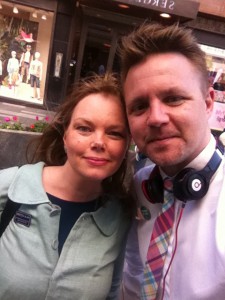
Jag är bekant med Fredrick sedan tidigare och har med stort intresse följt hans kampanj på nätet och I media sedan starten förra hösten. Han har gjort ett enormt arbete som omfattat besök i över 90 kommuner, studiecirklar och öppna kampanjverkstäder. Med politiker som Federley blir demokratin levande och trovärdig. Som tredje namn på centerpartiets lista behöver han kryssas in I EU och jag tror han kommer att lyckas. Igår besökte jag Fredrick i valstugan på Sergels torg för att heja på och byta några ord i slutspurten.
Fredrick Federley har alla egenskaper som behövs för att verka I Europaparlamentet. Han är utbildad statsvetare och har varit politiskt engagerad i hur manga år som helst. Från att ha varit ordförande för centerpartiets ungdomsförbund kom han 2006 in i riksdagen. I riksdagen har han varit centerpartiets representant i EU-nämnden de senaste åtta åren och bland annat deltagit i OSSE-samarbetet. Han är kunnig om Europafrågor från ett lokalt och nationellt perspektiv, särskilt kunnig om migration, säkerhetspolitiska frågor och internet. Under sitt engagemang som politiker har han skapat ett Europeiskt nätverk med värdefulla kontakter. Han är en idépolitiker som törs och vågar stå upp för sina värderingar och människors lika värde och handla därtill. Han är en också en omtyckt politiker med goda relationer över partigränser och han är en begåvad och välformulerad debattör på svenska och engelska. Tror han har grunderna i fler språk men minns inte vilka. Att kunna flera europeiska språk i tal och skrift är såklart meriterande när man kandiderar till Europaparlamentet.
Fredrick Federleys personvalskampanj tar sin utgångspunkt I centerpartiets gemensamma valplattform för EU-valet 2014.
Centerpartiet arbetar för att:
- EU blir smalare men vassare.
- EU blir grönare.
- Samarbetet underlättar för jobb och tillväxt I hela Europa.
- EU är öppet och solidariskt.
- Euron inte ska införas som valuta I Sverige.
Federley värnar om
- Ökad rörlighet
- Stärkt Integritet
- Bättre djurskydd
Att rösta I EU-valet är inte samma sak som att rösta I de nationella valen. Det kan för väljaren handla om en kompromiss mellan ideologisk övertygelse, enstaka intressefrågor och personliga egenskaper. Centerpartiet har en I grunden positiv syn på EU med vissa pragmatiska reservationer. Byråkratin får inte växa och Euron ska inte införas som valuta I Sverige. Jag vill ha mer Europa, en gemensam kulturpolitik och ha kvar jämställdhetsinstitutet! Jag tycker det är en dålig idé att banta en redan bantad byråkrati. Det är en myt att EU är en byråkratisk koloss, sanningen är den att EU: s administration I jämförelse med en nationalstat är mycket slimmad.
För mig är Fredrick Federley bredare än sitt parti. Även om jag inte delar centerpartiets syn I alla frågor kan jag rösta på honom. Jag vet att han kommer att stå upp för utvecklingen av ett starkt Europa om än lite smalare än det Europa jag önskar mig I framtiden. Han kommer att stå upp emot den framväxande främlingsfientligheten i Europa. Han kommer att verka för fred, demokrati och mänskliga rättigheter för kvinnor och barn, mångfald och tillgänglighet, för en grön ekonomi och ökad rörlighet, för utvecklingen av ett digitalt kunskapssamhälle med stärkt integritet och inte minst för djurens välfärd. Fredrick kommer att vara drivande när det gäller och kommer att kunna representera mig som svensk Europeisk medborgare I internationella relationer. Vi delar värderingar och samsyn i många för mig avgörande frågor.
Jag känner mig trygg att rösta på Fredrick Federley i Europaparlamentsvalet även om jag kompromissar med en del av min demokratiska övertygelse. Vem vill inte kryssa en sakkunnig och generös politiker med sunda värderingar och hjärta I det han gör? Med det sagt är jag inte centerpartist utan fortfarande obunden ett politiskt parti. En väljare som varje gång gör en demokratisk valanalys innan jag röstar. I historien har jag röstat olika. I det här valet röstar jag på en vass toppkandidat i valrörelsen som tror på Europa som en i grunden god idé.
Fredrick Federley om någon förtjänar att komma in i Europaparlamentet, med hårt arbete och en begränsad kampanjbudget har han lyckats skapa en hel folkrörelse kring sin kandidatur. Lyckas centerpartiet få två mandat i EU-valet är det tack vare Federley-effekten. Sverige behöver Fredrick Federley i Europa. Europa behöver Fredrick Federley. Jag önskar Fredrick lycka till och håller tummarna! Han platsar i Europaparlamentet och kommer att göra skillnad.
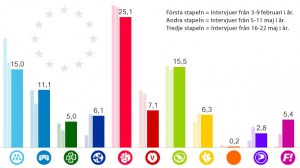
Läs mer om centerpartiets EU-valsplattform.
Följ Fredricks kampanj i hans blogg www.Federley.se.
Idag debatterar Fredrick på Mälarhöjdfesten kl. 12. 30 för den som vill lyssna.
OVÄNTAT EU-STÖD FRÅN KOMIKERN MAGNUS BETNER!
Med det enkla budskapet ”Gå och Rösta”!
Agera mot den ökande främlingsfientligheten! Betner är för ett starkt och demokratiskt Europa och lyfter fred, mänskliga rättigheter och öppna gränser som kärnan i EU-samarbetet. Se filmen! Mycket glädje.


